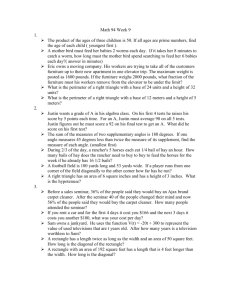Tattoo - English for Everyone
advertisement
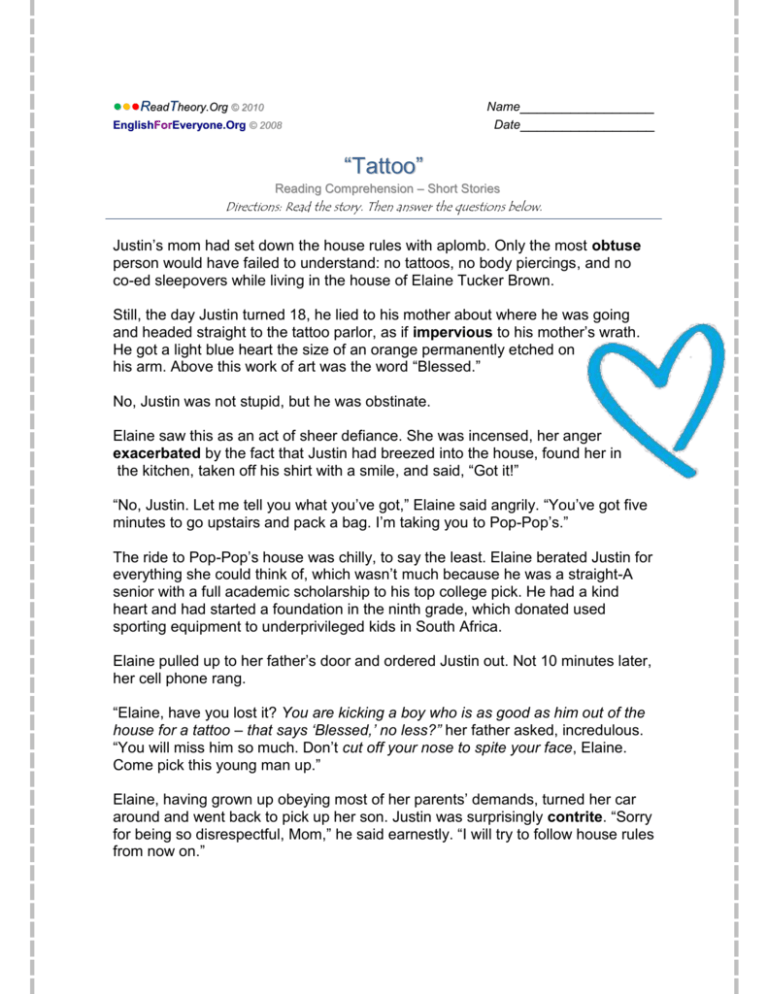
●●●ReadTheory.Org © 2010 Name________________ Date________________ EnglishForEveryone.Org © 2008 “Tattoo” Reading Comprehension – Short Stories Directions: Read the story. Then answer the questions below. Justin’s mom had set down the house rules with aplomb. Only the most obtuse person would have failed to understand: no tattoos, no body piercings, and no co-ed sleepovers while living in the house of Elaine Tucker Brown. Still, the day Justin turned 18, he lied to his mother about where he was going and headed straight to the tattoo parlor, as if impervious to his mother’s wrath. He got a light blue heart the size of an orange permanently etched on his arm. Above this work of art was the word “Blessed.” No, Justin was not stupid, but he was obstinate. Elaine saw this as an act of sheer defiance. She was incensed, her anger exacerbated by the fact that Justin had breezed into the house, found her in the kitchen, taken off his shirt with a smile, and said, “Got it!” “No, Justin. Let me tell you what you’ve got,” Elaine said angrily. “You’ve got five minutes to go upstairs and pack a bag. I’m taking you to Pop-Pop’s.” The ride to Pop-Pop’s house was chilly, to say the least. Elaine berated Justin for everything she could think of, which wasn’t much because he was a straight-A senior with a full academic scholarship to his top college pick. He had a kind heart and had started a foundation in the ninth grade, which donated used sporting equipment to underprivileged kids in South Africa. Elaine pulled up to her father’s door and ordered Justin out. Not 10 minutes later, her cell phone rang. “Elaine, have you lost it? You are kicking a boy who is as good as him out of the house for a tattoo – that says ‘Blessed,’ no less?” her father asked, incredulous. “You will miss him so much. Don’t cut off your nose to spite your face, Elaine. Come pick this young man up.” Elaine, having grown up obeying most of her parents’ demands, turned her car around and went back to pick up her son. Justin was surprisingly contrite. “Sorry for being so disrespectful, Mom,” he said earnestly. “I will try to follow house rules from now on.” Questions: 1) What other title would best fit this passage? A. B. C. D. “House Rules” “Visiting Pop-Pop” "Straight A's" “Body Piercings” 3) Which of the following proverbs does Elaine seem to learn by the end of the story? 2) As used in paragraph 1, which is the best antonym for obtuse? A. B. C. D. foolhardy intelligent passionate stubborn 4) Which of the following proverbs does Justin seem to learn by the end of the story? A. much ado about nothing B. familiarity breeds contempt C. no arguments will give courage to the coward D. if words suffice not, blows must follow A. look before you leap B. pleasure bought with pain hurts C. youth’s first duty is reverence to parents D. if men had all they wished, they would often be ruined 5) In the final paragraph, the author writes, "Justin was surprisingly contrite." Which of the following is the best way to rewrite the above sentence while keeping its original meaning the same? 6) What was Justin's attitude when he showed his mother the tattoo? A. B. C. D. willfully defiant cautiously jubilant convincingly contrite obviously melodramatic A. Justin was surprisingly relaxed. B. Justin was surprisingly remorseful. C. Justin had surprisingly lost his bad attitude. D. Justin had surprisingly become somber. 7) As used in paragraph 2, which is the best antonym for impervious? A. B. C. D. elated impenetrable invigorated vulnerable 8) As used in paragraph 4, which is the best antonym for exacerbated? A. B. C. D. intensified evened extinguished decreased Questions (continued): 9) "You are kicking a boy as good as him out of the house for a tattoo – that says ‘Blessed,’ no less?” The above sentence from the story has a grammatical error. Which of the following correctly identifies this error? A. B. C. D. good should be well him should be he 'Blessed,' should be "Blessed," less should be lest 10) Using the passage as a guide, which is the best interpretation of the idiom, "cut off your nose to spite your face," as used in paragraph 8? A. calling something bad that is not B. trying to teach something too difficult C. loving a person less for what he has done D. pursuing revenge and hurting yourself in the process Have you ever done anything rebellious? Explain. ________________________________________________________________________ ________________________________________________________________________ ________________________________________________________________________ ________________________________________________________________________ ________________________________________________________________________ ________________________________________________________________________ ________________________________________________________________________ ________________________________________________________________________ ________________________________________________________________________ ________________________________________________________________________ ________________________________________________________________________ ________________________________________________________________________ ________________________________________________________________________ ________________________________________________________________________ Answers and Explanations 1) A The story is about what happens when Justin purposely breaks his mother’s rules and gets a tattoo. The first thing his mother, Elaine, does is take him to his grandfather’s house. Justin is only there for a short time, however, because his grandfather calls Elaine and tells her to pick Justin up. Elaine, who is used to obeying her own parents, picks up Justin. He apologizes to his mother and promises to follow the house rules. Viewed this way, we see this story is about rules. Therefore (A) is correct. Justin’s mother does take him to Pop Pop’s, but that is only one part of the story. It does not reflect the meaning of the story. Therefore (B) is incorrect. The fact that Justin is a straight-A student is just one detail in the story. Therefore (C) is incorrect. Elaine did forbid body piercings, but the story is in no way about them. Therefore (D) is incorrect. ` 2) B obtuse (adjective): unintelligent; not sharp. In paragraph 1, the story says, “Justin’s mom had set down the house rules with aplomb.” From this information, we know that Justin’s mom made the rules clear. Then the story says, “Only the most obtuse person would have failed to understand.” Since the rules were very clear, they were easy to understand. An obtuse person is someone who is unintelligent. Intelligent is a good antonym for unintelligent. Therefore (B) is correct. A foolhardy person is rash and doesn’t pay attention to consequences. This is different from being unintelligent, but is not an antonym. Therefore (A) is incorrect. A passionate person feels things very deeply. Again, this is different from being intelligent, but is not an antonym. Therefore (C) is incorrect. A stubborn person refuses to change their thinking or actions even when he or she should. Someone can be unintelligent and stubborn at the same time, so stubborn is not an antonym for obtuse. Therefore (D) is incorrect. 3) A Elaine made a big fuss about the tattoo. She got angry and made Justin leave the house. At the end, she listens to her father and takes Justin back home. She seems to have realized that Justin is a good kid even though he broke her rule. Since Elaine made a big deal out of something that seems to matter very little by the end of the story, the phrase much ado about nothing fits well. Therefore (A) is correct. The phrase familiarity breeds contempt means that we tend to have little regard for the things we know very well. Elaine seems to have a high regard for her son at the end of the story. Therefore (B) is incorrect. No arguments will give courage to the coward means that explaining to someone why they should not be afraid of something does not alleviate their fear. Now that Justin has a tattoo, Elaine is probably less afraid of what will happen, not more. Therefore (C) is incorrect. If words will not suffice, blows must follow means that when threats fail to bring about the desired result, action must be taken. Elaine has both made threats and followed through on them. However, it was not really a good thing that Elaine followed through on the threat. Therefore (D) is incorrect. 4) C In the story, Justin is punished for not obeying his mother. He also benefits from his mother’s own respect for her father, because she listens to her father and takes Justin home. At the end of the story, Justin has learned that respecting his mother is important. He apologizes and promises to obey the rules. He seems to have learned that youth’s first duty is reverence to parents. Therefore (C) is correct. Justin did not get into trouble because he did something without knowing what he was getting into. Therefore (A) is incorrect. Justin did not ruin himself for the sake of a little fun. Therefore (B) is incorrect. Justin does not have everything he ever wished for. Therefore (D) is incorrect. 5) B contrite (adjective): feeling sorry for doing something wrong. In the final paragraph, Elaine picks up Justin from Pop-Pops. The passage says, “Justin was surprisingly contrite. ‘Sorry for being so disrespectful, Mom,’ he said earnestly. ‘I will try to follow house rules from now on.’” Since Justin apologizes and tells his mother that he will do as she says, we can infer that contrite means being sorry for doing something wrong. Feeling remorseful is feeling sorry. Therefore (B) is correct. Feeling relaxed is not feeling worried or anxious. This is different from feeling sorry. Therefore (A) is incorrect. While someone probably does lose his bad attitude when he is contrite, it is not the same as being contrite. Therefore (C) is incorrect. Someone who is somber is very serious. People are usually serious when they are contrite, but being serious is not the same as being sorry. Therefore (D) is incorrect. 6) A We know that Elaine has forbidden tattoos for anyone living at her house. We also know that Justin got a tattoo. In paragraph 3, the story says, “Justin had breezed into the house, found her in the kitchen, taken off his shirt with a smile, and said, ‘Got it!’” We can infer from this information that not only has Justin disobeyed his mother, he has made a point of showing her. Since Justin is purposefully challenging his mother’s authority, he is willfully defiant. Therefore (A) is correct. Justin was not cautious. He made a point of showing his mother the tattoo, rather than hiding it. Therefore (B) is incorrect. Being contrite is being sorry. Justin is obviously not sorry when he shows his mother the tattoo. Therefore (C) is incorrect. Someone is melodramatic if he is excessively emotional. Justin is not particularly emotional. Therefore (D) is incorrect. 7) D impervious (adjective): not capable of being affected; not capable of being penetrated. In paragraph 1, we learn that Elaine has a strict rule about no tattoos. In paragraph 2, the story says, “Still, the day Justin turned 18, he lied to his mother about where he was going and headed straight to the tattoo parlor, as if impervious to his mother’s wrath.” Since Justin knows that his mother will feel angry about the tattoo, getting a tattoo anyway shows that fear of his mother does not get to him. We can infer from this information that something impervious is impossible to affect. Something vulnerable is easy to affect. Vulnerable is a good antonym for impervious. Therefore (D) is correct. Elated means very joyful and happy. Joyful is not the opposite of impossible to affect, so elated is not an antonym for impervious. Therefore (A) is incorrect. Impenetrable means impossible to get through. This is similar to being impossible to affect, which means impenetrable is a synonym for impervious, not an antonym. Therefore (B) is incorrect. Invigorated means energized and full of strength. This is different from being impossible to affect, but not opposite, so invigorated is not the opposite of impervious. Therefore (C) is incorrect. 8) D exacerbate (verb): to aggravate; to make worse. Paragraph 4 says, “Elaine saw this as an act of sheer defiance. She was incensed, her anger exacerbated by the fact that Justin had breezed into the house, found her in the kitchen, taken off his shirt with a smile, and said, ‘Got it!’” In this paragraph, Elaine is angry because Justin has defied her. Her anger was exacerbated because Justin flaunted his disobedience. Therefore, we can infer that exacerbated means made worse. If Elaine’s anger had decreased, it would have been made better. Therefore (D) is correct. When something is intensified, it is made greater. This means intensifying Elaine’s anger and exacerbating Elaine’s anger are the same. Therefore (A) is incorrect. When something is evened, it is made level. Leveling Elaine’s anger is not the same as making it greater, but it is not opposite. Evened is not an antonym for exacerbated. Therefore (B) is incorrect. To extinguish is to put something out completely. Putting something out completely is not the opposite of making something worse, so extinguished is not an antonym for exacerbated. Therefore (C) is incorrect. 9) B The phrase who is as good as him is a subordinate clause. A subordinate clause requires the pronoun he, not him. The implied meaning of the phrase is “as good as he is.” “As good as him is” is grammatically incorrect. Therefore (B) is correct. Good is an adjective. It modifies nouns. Well is an adverb. It modifies verbs. Since him is a pronoun, it should be modified by an adjective, not an adverb. Therefore (A) is incorrect. Single quotation marks are appropriate for both a quote within a quote and a word that is not being used for its meaning. Since Pop-Pop is being quoted and quoting the word tattooed on Justin, single quotes are appropriate. Therefore (C) is incorrect. The word lest means so that something will not happen. For example, We should get out of the rain lest we catch cold. This meaning does not make sense in the sentence. Therefore (D) is incorrect. 10) D In paragraph 8, Elaine’s father wonders why she would kick such a good boy out of the house. He says, “You will miss him so much. Don’t cut off your nose to spite your face, Elaine. Come pick this young man up.” Elaine has forced Justin out of the house even though it will hurt her. We can infer from this that the idiom cut off your nose to spite your face means pursuing revenge and hurting yourself in the process. Therefore (D) is correct. The story does not provide information to support answer choices (A), (B), or (C). Therefore they are incorrect.
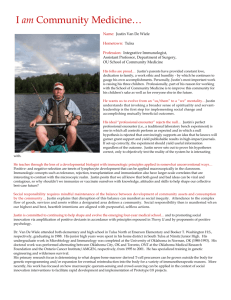
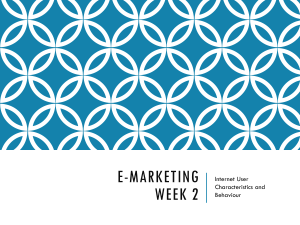

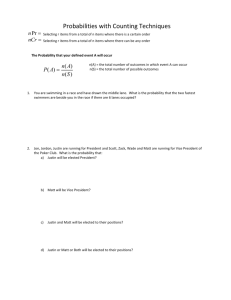
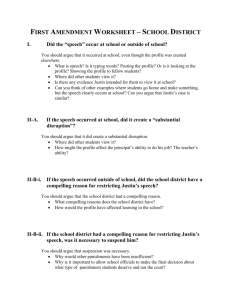
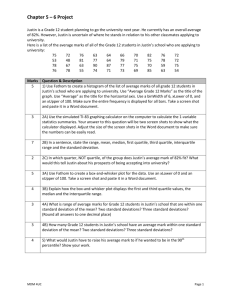
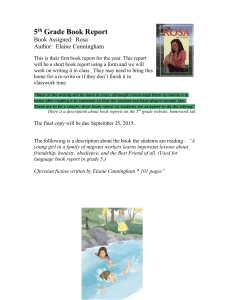
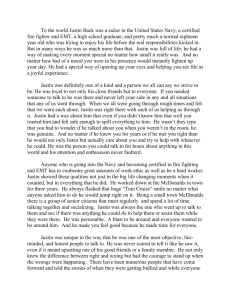
![The Irony of Love (122) [by Proud 86].](http://s3.studylib.net/store/data/007306595_1-aca9830606a408d7bdeb2a12d7258405-300x300.png)
